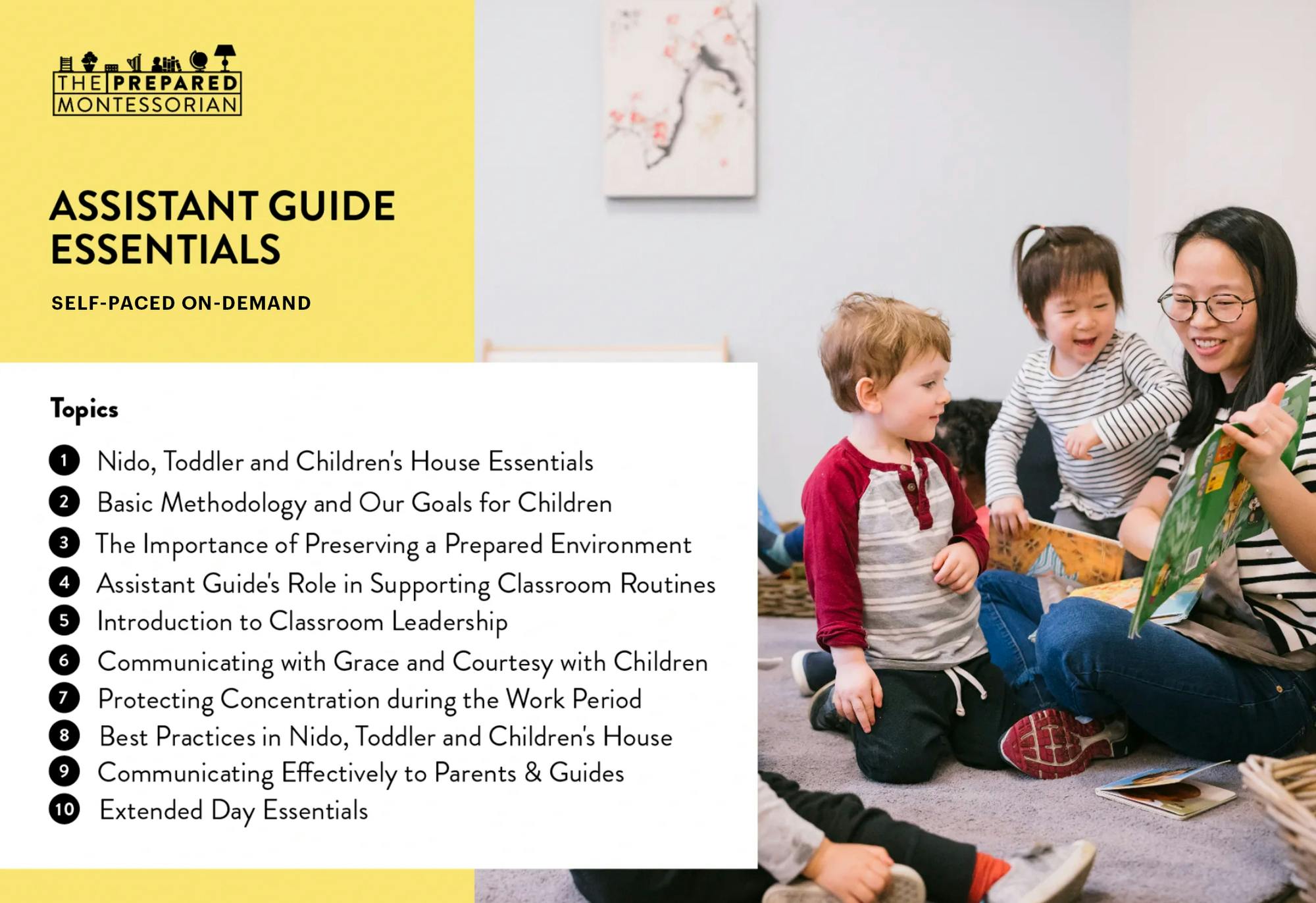Assistant Guide Essentials
Assistant Guide Essentials
OVERVIEW
Course format
This course consists of 10 topics. For each topic, you will watch a 90-minute session video and complete an assignment at your own pace. You will have access to learning and teaching resources that will help you put the learning into practice both during and after you complete the training. This course is designed for Assistant Guides that are currently working in a Montessori classroom with children between 0 to 6 years old.
Estimated time to complete course: 20-30 hours
The course is perfect for
Assistant Guides that are currently working in a Montessori classroom with children between 0 to 6 years old.
What you’ll walk away with
- A comprehensive understanding of the Montessori method and its goals.
- Best practices for supporting independence and concentration in children.
- Tools for effective classroom leadership and communication with adults.
- Clear, key takeaways from each topic to turn class knowledge into action.
WHAT WILL BE DISCUSSED
Targeted for Assistant Guides who are currently working in a classroom, this course is intended to be as practical as possible. Rather than absorbing knowledge to use in the future, this course aims to offer immediate tools to a Montessori adult to grow in their practice of the Montessori approach.
Topics include:
Nido, Toddler, and Children’s House Essentials
This first session introduces the core components of the Montessori approach to early childhood education. We define the Prepared Environment, the Prepared Adult, and Normalization. We will explore the importance of the uninterrupted Work Period, the mixed-age classroom, and what it means when we say Montessori "Follows the Child."
Basic Methodology and Our Goals for Children
The Montessori approach supports four goals in children. In this session, we explore how an Assistant Guide can support these goals in individual children and the classroom as a whole. This session concludes by offering straightforward tools that an Assistant Guide can immediately practice in the classroom.
The Importance of Preserving a Prepared Environment
In this session, we focus on the physical components of the prepared environment. First, we introduce the order, logic, and beauty of the Montessori materials themselves. Once we learn the physical principles, we offer practical tips for tidying Montessori materials during the day, even if you are not familiar with the material.
Assistant Guide’s Role in Supporting Classroom Routines
We cover the non-physical components of the Prepared Environment, such as routines, behavior (Grace and Courtesy), and limits. Keeping our four goals for children in mind, we offer best practices for the Assistant Guide to implement in the classroom. Our aim is consistency, regardless of which adult is leading the classroom.
Introduction to Classroom Leadership
We frame classroom leadership with one overarching goal for children: Self-Discipline. We examine a progression of steps to build trust with children. Traditionally referred to as "Classroom Management," we use the term Classroom Leadership to emphasize that the role of the adult is to inspire the child to take responsibility in protecting the expectations and limits of an environment.
Communicating with Grace and Courtesy
This session relies on reflections and role-playing to challenge traditional methods of communication. We offer new strategies for a Montessori adult to use to inspire a child to self-disciplined behavior. We address commons do's and don'ts of vocabulary with young children and how to strengthen positive discipline and phrasing.
Protecting Concentration During the Work Period
With our goals for children in mind, we discuss how the Assistant Guide can support the Lead Guide in Montessori Presentations. This session focuses on three areas for the Assistant Guide to protect concentration: the concentration of the child receiving the presentation, the other children in the classroom who are independently working, and those that need to be redirected to purposeful work.
Best Practices in Nido, Toddler, and Children’s House
Since each age group looks a little different in how our goals for children are achieved, this session offers an overview of Nido, Toddler, and Children’s House. We discuss the key elements and objectives for each age group in an easy-to-understand format.
Communicating Effectively to Parents and Guides
This session focuses on extending grace and courtesy to adult communication. We cover the best practices for communication and conflict between adults: with the Lead Guide and with other Assistant Guides. We also explore appropriate interactions with parents versus what information should be communicated by the Lead Guide.
Extended Day Essentials
In this session, we offer best practices for planning activities that support our goals for children. We cover different ideas for activities, such as cooking, gross motor activities, and art, and how to create purposeful work for children. In addition, we explore practical tips for how to plan and organize these extended day activities.
